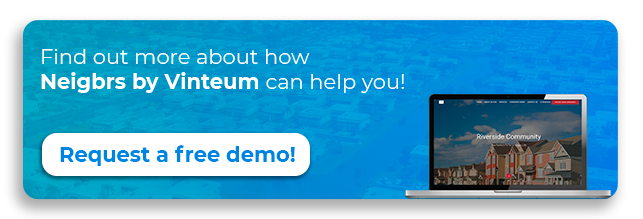Understanding HOA board conflict of interest is essential for ensuring a fair and transparent community. This article serves as your comprehensive guide, highlighting common examples and providing practical tips to stay clear of them. Let’s explore this crucial aspect of community governance to ensure a harmonious living environment for all homeowners.
HOA board members are expected to act in the best interest of their community — but navigating potential conflicts of interest can be tricky. That’s where Neigbrs by Vinteum comes in. Our platform helps boards operate transparently with centralized communication, document storage, and clear decision-making tools that build trust and prevent misunderstandings.
Want to strengthen accountability in your HOA? Request a free demo and see how Neigbrs can support ethical and effective board management.

What is conflict of interest in an HOA?
Conflict of interest within an HOA occurs when board members have personal interests that may interfere with their duty to act in the best interests of the community. These conflicts can arise in various scenarios, ranging from financial decisions to vendor contracts and beyond. Understanding what constitutes a conflict of interest is crucial for maintaining transparency and trust within the HOA community.
3 Examples of conflict of interest in HOA
Vendors contracts
This occurs when board members award contracts to companies they have personal connections with, rather than selecting the most suitable option for the community’s needs. In this case, it could be the board member’s own company or the company of a friend or family member.
Here’s an example: Imagine a board member who owns a landscaping company. When it comes time to select a contractor for lawn maintenance in the community, this board member advocates for awarding the contract to their own company, despite other options offering better rates and services. This decision benefits the board member financially but may not be in the best interest of the HOA.
Accepting benefits
This occurs when board members receive perks or favors from vendors or service providers in exchange for favoritism, it compromises their impartiality.
Here’s an example: suppose a board member receives free tickets to a concert from a vendor bidding for a contract to renovate the clubhouse. The vendor hopes this gesture will influence the board member’s decision in their favor. Accepting these tickets creates a conflict of interest. The board member may feel obligated to favor the vendor over others, compromising the fairness of the selection process.
Exploiting Privileged Information for Personal Gain
This occurs when board members use confidential information acquired through their position for personal advantage, instead of acting in the best interests of the community.
Here’s an example:Let’s say a board member learns about plans for a community-wide landscaping project before it’s announced. Instead of waiting for the public announcement, the board member purchases shares in a landscaping company that is likely to be awarded the contract. When the project is officially revealed, the value of the landscaping company’s shares increases, allowing the board member to profit from their insider knowledge. This action prioritizes personal gain over the fair and transparent operation of the HOA.
3 Tips to Stay Away from HOA Board Conflict of Interest
Recognize conflict of interest
Pay close attention to the decision-making processes within your HOA board meetings. If certain members consistently advocate for decisions that benefit themselves or their associates, it could indicate a conflict of interest. If you are serving on the board yourself, it’s crucial to acknowledge these conflicts within your own actions. It is easy to find ourselves in situations of conflict of interest without even realizing it.
Survey vendors thoroughly
When selecting vendors for HOA projects or services, conduct thorough research and consider multiple options. Avoid favoritism and ensure that vendor selections are based only on what’s best for the community. For example, if one board member consistently pushes for a particular vendor without considering other options, it may raise concerns about bias.
Seek legal advice
If you suspect that a conflict of interest exists within your HOA board, don’t hesitate to seek legal counsel. These issues can be hard to navigate without the proper knowledge. A legal professional can provide guidance on how to address the situation effectively and protect the interests of the community.
Bonus tip: Advocate for transparency and accountability
To promote transparency and accountability in your HOA, try these simple steps:
First, consider using HOA management software. It helps store documents online and keeps everyone in the association connected and informed.
Next, share important updates with homeowners regularly, like financial reports and meeting notes. HOA software makes it easy to share these details with everyone.
Encourage homeowners to speak up and share their thoughts. Listen to their concerns and respond openly. This shows you are committed to being fair and responsive.
Lastly, make sure your board has clear rules for decision-making. Review and update these rules and policies regularly to keep things fair and transparent for everyone.
Wrapping up on HOA board conflict of interest
HOA board conflict of interest is a serious issue. It’s crucial to know how to spot and prevent them. Stay vigilant, and communicate openly with homeowners. Regularly review and refine board policies for accountability and transparency. With these steps, your HOA can handle conflicts effectively and create a fair and harmonious community for all.




